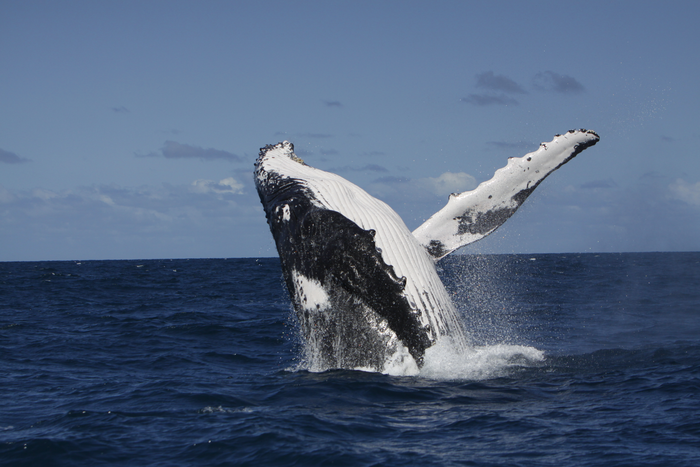A University of Queensland-led study has found humpback whales can learn incredibly complex songs from whales from other regions.

Credit: The University of Queensland
A University of Queensland-led study has found humpback whales can learn incredibly complex songs from whales from other regions.
Dr Jenny Allen, whose doctoral work at UQ’s School of Veterinary Science led to the study, said researchers found New Caledonian humpback whales could learn songs from their counterparts from Australia’s east coast with remarkable accuracy.
“This really indicates a level of ‘cultural transmission’ beyond any observed non-human species,” Dr Allen said.
The study looked closely at the song patterns of male humpback whales from each region between 2009 and 2015, to examine how culture transmits between the populations.
Dr Allen said the complexity of the songs was determined by measuring both the number of sounds the whales made and the length of the sound patterns.
“By listening to the Australian humpback population, we were able to see if the songs changed in any way when sung by the New Caledonian whales,” Dr Allen said.
“We found they actually learned the exact sounds, without simplifying or leaving anything out.
“And each year we observed them they sang a different song, so it means humpback whales can learn an entire song pattern from another population very quickly, even if it’s complex or difficult.”
The findings support the idea that songs are being learned by whales on shared migration routes like New Zealand or shared feeding grounds like Antarctica.
“It’s rare for this degree of cultural exchange to be documented on such a large scale in a non-human species,” Dr Allen said.
“We hope these findings provide a model for further study into understanding the evolution of cultural communication in animals and humans.”
While humpback whales have recently been taken off the endangered species list, Dr Allen said their populations still need to be carefully managed, and these findings could help.
“Having an in-depth understanding of a species is known to greatly improve the efficacy of conservation and management methods,” Dr Allen said.
“We now have a more holistic picture of the behaviours, movements and interactions of different humpback whale populations, including how they transmit culture.
“It means we’re better equipped to protect them against the many threats they face as our climate, and planet, continue to change.”
The research is a collaboration with Opération Cétacés from New Caledonia and has been published in Scientific Reports.
Audio and pictures here.
Journal
Scientific Reports
DOI
10.1038/s41598-022-12784-3
Method of Research
Observational study
Subject of Research
Animals
Article Title
Song complexity is maintained during inter-population cultural transmission of humpback whale songs




